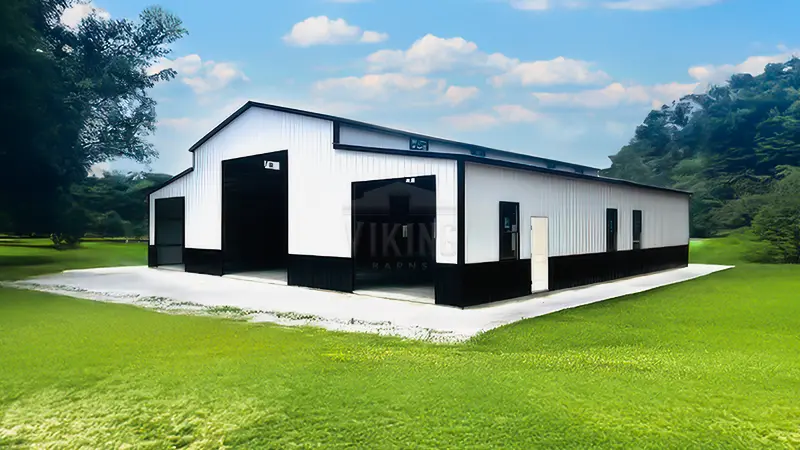Along with snow-capped mountains and beautiful landscapes, winter brings several challenges — especially if you are a horse owner. From freezing temperatures to harsh winds to reduced access to grazing, these difficulties make it imperative for you to protect your equines. To keep your horses healthy and comfortable in the winter months, you need a comprehensive care plan — from housing them in a sturdy horse steel barn to feeding them properly.
Winters can cause significant issues for your horses and have a direct impact on their health and comfort. In this blog, we will explore how to safeguard your equestrian creatures from harsh winters while maintaining their comfort.
Why Caring for Your Horses is Critical in the Winter?
Often, winters affect the health, performance, overall well-being, and operationality of the horses. Freezing temperatures can be harsh on equines. Hence, it becomes imperative to provide proper care for your horses in the colder months in order to prevent seasonal challenges such as:
- Maintain body condition: In winter, horses are likely to burn more calories in order to stay warm. This can lead to weight loss and a weakened immune system. Therefore, it becomes more essential to ensure a proper diet and shelter to maintain their health.
- Prevent illness: Cold weather can increase the risk of respiratory issues, colic, joint stiffness, and other diseases. With proactive care, you can minimize these risks and maintain the optimal health of your equines
- Avoid dehydration: Horses are likely to drink less water during the winter season, which often increases the risk of dehydration. This is why providing consistent access to warm water is extremely necessary.
- Ensure comfort: Harsh weather conditions, like icy surfaces and freezing winds, can lead to significant discomfort. Proper shelter, footing, bedding, and dry spaces play a huge role in protecting your horses.
- Sustain performance: Whether you utilize your horses for riding or training, adequate winter care is essential to ensure that they are ready for action once the warm weather returns.
Essential Care Tips to Keep Your Horse Healthy in Winters
Preparing a Safe Shelter
In order to protect horses from harsh winter elements, it is essential to provide them with proper shelter. A well-insulated steel barn building with adequate ventilation is extremely important for the good health of your animals.
Investing in a metal barn for horse, you can offer superior protection against snow, high-speed winds, and moisture buildup. Metal barns can also effectively regulate temperature and prevent condensation, keeping the barn dry and comfortable.
Steel barns are highly sturdy and can resist pest infestations, wear and tear, rusting, and fires, which makes them perfect for house horses safely.
Make sure that each horse has adequate stall space to move around and lie down comfortably while staying warm. The standard stall size should be 12 feet wide and 12 feet long. However, for larger horses, you can go for 14 feet wide and 14 feet long stalls.
Moreover, you should opt for thick bedding materials like straws or shavings in order to provide insulation as well as comfort.
Providing Proper Nutrition
Horses are likely to burn calories at a faster pace to keep themselves warm during the winter seasons. It is extremely important that you adjust their diet accordingly. You should:
- Increase the intake of forage. It is ideal to ensure that hay is the primary source of nutrition for your horse as it is likely to generate heat within them through digestion.
- In order to meet the increased energy demands, add grains to your horse’s diet. However, you should consistently monitor them for weight gain.
- It is also critical to provide a constant feed supply for your horses.
- To motivate your horses to drink water so that they do not dehydrate themselves, you should set up water buckets in the horse steel barn for consistent access. Make sure that you use heated buckets or heated waterers, as cold water in winter is likely to deter them from drinking.
Maintaining Hoof Health
Winters can especially be difficult on your horse’s hooves and can often lead to ice buildup, infections, dryness, and cracking. A few things to do in order to prevent these issues are:
- Inspect the hooves of your horses daily and make sure that they have a dry place to stand. The hooves should remain dry as wet hooves can rot if left for a long time.
- Trim your equine’s hooves regularly to stop snow and ice accumulation. Typically, you should trim in every 6 weeks to prevent ice balls in their feet. It will also reduce slipping risks.
- Moisturize the hooves to heal the cracks that are caused by dry winter conditions.
- For icy terrains, consider investing in hoof boots or non-slip coatings.
- Make your horses go barefoot during winters, too to allow your horses some rest from metal shoes.
Layering for Warmth
Blanketing your horse can be critical, as you should know how to hit the balance between keeping them warm and causing overheating. You should consider:
- Choose the right blankets. They should be lightweight, waterproof, and breathable, making them ideal for mild winters. You can also opt for heavier blankets for the coldest days.
- Check under the blanket regularly to make sure that the equines are not sweating or rubbing due to irritation. Monitoring for overheating is imperative for better health.
- Brush your horse’s coat and remove dirt, sweat, dust, and debris to maintain its insulating properties. This will also allow you to monitor their coat health.
- Look for signs of frostbite, weight loss, illnesses, or ticks. Inspect the horses for health issues so that you catch the problems early and prevent serious complications.
Exercising Your Horse Safely
During winter, exercising becomes crucial for your horses in order to prevent them from becoming overweight and maintain their health.
- As cold air can be tough on the respiratory systems of your horses, you should keep the workouts moderate and short.
- Make sure to include warm-ups and cool-down workouts, too. This will help you avoid sudden exposure of horses to cold after exercise and muscle stiffness.
- Opt for sand or rubber mats in high-traffic areas in order to prevent slipping on ice.
Managing Social Interaction
We all know that horses are social animals, and they constantly require companionship, even in winter months. You should:
- Allow them to hang out daily in the enclosed metal horse barns to interact socially and move around.
- Group your horses based on their compatibility levels and reduce stress and competition among them.
- Provide ample time in loafing sheds to ensure comfort and grazing in the winter sun.
Emergency Preparedness for Harsh Winters
The winter season is unpredictable, and it often brings frozen pipes, hoses, and troughs. Therefore, it is essential to have a proper plan for emergencies to keep your horses safe in harsh winter conditions. A few things to do are:
- Keep extra hay and bedding in case of snowstorms. Aim for at least a 2-week surplus.
- Invest in generators to keep your barn heated and lights operational during power outages.
- Maintain a fully stocked first aid kit for your equine, including supplies for frostbite or cuts.
- Make sure your metal barn structures are equipped to handle freezing temperatures. Certified structures can often withstand snow loads of up to 80 lbs per square foot and wind speeds of up to 180 miles per hour.
- Your trailer should be winter-ready in case evacuation becomes necessary.
Ensuring Your Horses Thrive This Winter
Caring for your horses in harsh winters requires diligence as well as proper preparation in order to combat the challenges posed by freezing temperatures. Use this season to evaluate your equines’ needs and implement thoughtful solutions. Winters can be a great opportunity for you to fine-tune their care routine. Your efforts during the cold months will pave the way for a healthier, happier spring, ensuring your horses are truly nurtured around the year.









